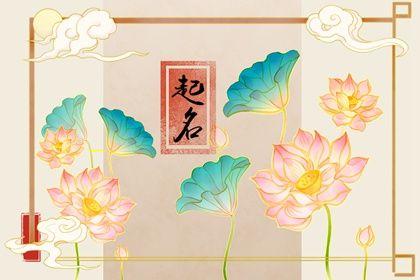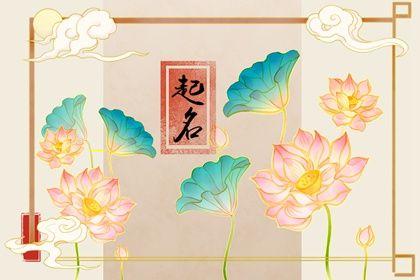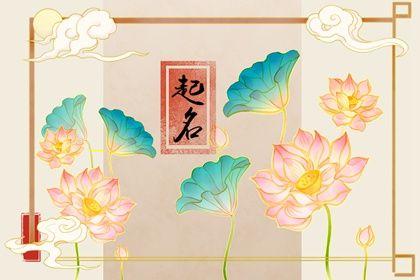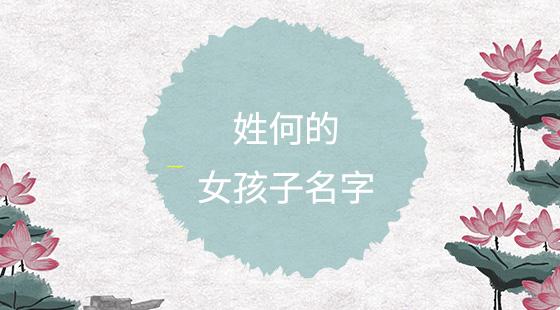为何说羽字放在名字第二位比较好呢
- 作者: 刘微兰
- 来源: 投稿
- 2024-08-03
一、为何说羽字放在名字第二位比较好呢
羽字放在名字第二位比较好的原因:
1. 寓意吉祥:羽字在汉语中寓意吉祥、飞扬、向上。放在名字第二位,寓意孩子前程似锦,展翅高飞。
2. 音韵优美:羽字发音为“yǔ”,音韵优美,与其他汉字搭配时,能形成悦耳动听的名字。
3. 笔画适中:羽字的笔画数为10画,放在名字第二位,既不会显得过于复杂,也不会过于简单,整体结构协调美观。
4. 寓意深远:羽字不仅寓意吉祥,还象征着自由、梦想和追求。放在名字第二位,寄托了父母对孩子未来发展的期望。
5. 避免重名:羽字作为名字第二位,可以有效避免重名的情况,让孩子的名字更具独特性。
6. 符合传统文化:在传统汉字文化中,羽字常被用于人名,尤其是放在名字第二位,寓意美好。
7. 寓意高雅:羽字给人一种高雅、脱俗的感觉,放在名字第二位,能提升名字的整体气质。
8. 寓意才华:羽字与“文”字同音,寓意才华出众、文采斐然。放在名字第二位,寄托了父母对孩子学业有成的期望。
9. 寓意健康:羽字与“羽翼”相关,寓意健康强壮、羽翼丰满。放在名字第二位,表达了父母对孩子身体健康的祝福。
10. 寓意幸福:羽字与“幸福”谐音,寓意幸福美满、生活如意。放在名字第二位,寄托了父母对孩子未来幸福生活的期望。
二、为何说羽字放在名字第二位比较好呢英语
It is considered auspicious to have the character "feather" (羽) in the second position of a Chinese name for several reasons:
Symbolism of Flight and Elevation: Feathers are associated with birds, which symbolize freedom, aspiration, and the ability to soar to great heights. Placing the character in the second position suggests that the individual will have a bright future and achieve success.
Balance and Harmony: The second position in a Chinese name is considered the "earthly branch" (地支), which represents stability and grounding. The character "feather" brings an element of lightness and upward movement, creating a harmonious balance between the two.
Auspicious Combinations: The character "feather" (羽) forms auspicious combinations with certain other characters. For example, the combination "羽化" (yǔ huà) means "to ascend to heaven," while "羽翼" (yǔ yì) means "wings," symbolizing protection and support.
Cultural Significance: In Chinese culture, feathers have been associated with nobility, elegance, and beauty. Placing the character in the second position of a name conveys a sense of refinement and grace.
Personalization: The character "feather" can also add a unique and personal touch to a name. It is not as common as other characters used in names, making it a distinctive choice.
Overall, having the character "feather" (羽) in the second position of a Chinese name is considered auspicious and symbolizes aspirations, balance, and personal distinction.

三、羽字放在名字里面怎么样
优点:寓意吉祥:羽字在汉语中寓意轻盈、飞翔、自由,给人以积极向上的感觉。
笔画简单:羽字只有5画,书写方便,适合作为名字用字。
音韵优美:羽字读音为“yǔ”,音韵优美,朗朗上口。
性别中立:羽字既可以用于男孩名,也可以用于女孩名,性别中立。
缺点:使用频率较高:羽字在名字中使用频率较高,可能会显得不够独特。
含义单一:羽字的含义相对单一,可能无法表达更丰富的内涵。
笔画较少:羽字只有5画,笔画较少,可能会影响名字的整体结构和美观。
建议:如果希望名字寓意吉祥、音韵优美,羽字是一个不错的选择。
为了避免使用频率过高,可以考虑与其他字搭配使用,如“羽飞”、“羽晴”、“羽墨”。
为了丰富名字的内涵,可以结合其他字的含义,如“羽翼丰满”、“羽化登仙”、“羽扇纶巾”。
为了提升名字的整体美观,可以考虑与笔画较多的字搭配使用,如“羽墨”、“羽萱”、“羽枫”。
总体而言,羽字放在名字里面寓意吉祥、音韵优美,但使用频率较高,含义单一,笔画较少。建议与其他字搭配使用,以提升名字的独特性和内涵。
四、羽字在名字为什么不好
羽字在名字中不好的原因:
1. 寓意不佳:羽毛轻盈,容易随风飘散,寓意不稳定、漂浮不定。
羽毛常与鸟类相关,而鸟类在传统文化中常被视为不吉利的象征。
2. 笔画繁琐:羽字有16画,笔画繁琐,书写不便,影响名字的整体美观。
3. 谐音不雅:羽字与“羽”谐音,有“轻浮、不靠谱”之意,不适合用在名字中。
4. 容易与其他字混淆:
羽字与“羽”字形相似,容易混淆,影响名字的辨识度。
5. 寓意过于单一:羽字只代表羽毛,寓意过于单一,缺乏内涵和深度。
6. 不适合特定性别:
羽字一般被认为是女性化的字,不适合用在男性名字中。
7. 容易产生负面联想:
羽毛常与“轻浮、虚荣”等负面特质联系在一起,使用羽字取名可能会产生不利的联想。
8. 缺乏阳刚之气:羽字给人一种柔弱、阴柔的感觉,缺乏阳刚之气,不适合用在男孩名字中。
9. 容易被误解为“羽翼未丰”:
羽字有“羽翼未丰”之意,用在名字中可能会让人联想到能力不足、经验欠缺。
10. 容易与“羽化登仙”混淆:
羽字与“羽化登仙”中的“羽”字同音,容易让人产生误解,影响名字的寓意。




